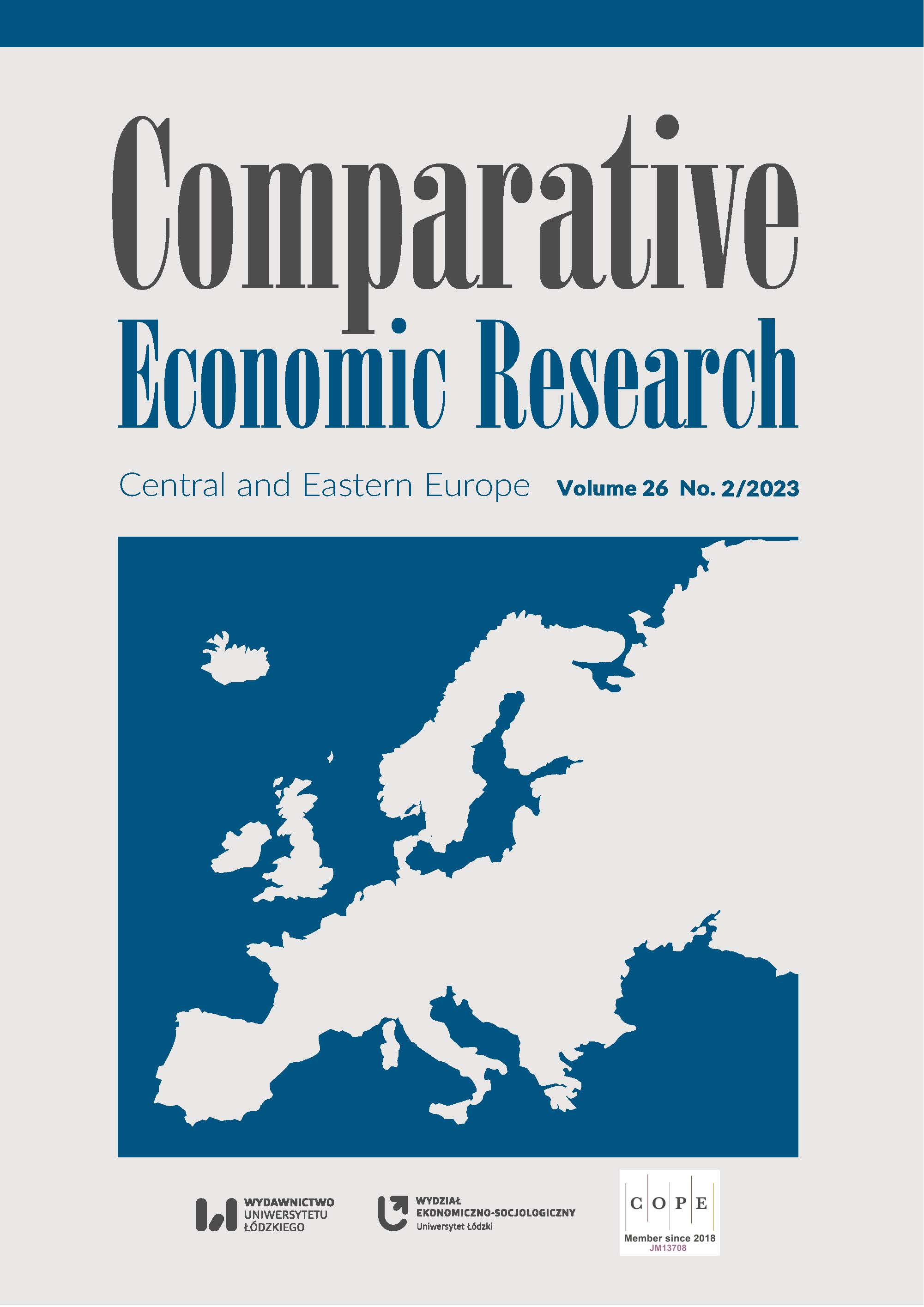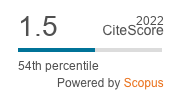Energy Subsidies and their Implications for CO2 Emissions in the Visegrad Group Countries
DOI:
https://doi.org/10.18778/1508-2008.26.12Keywords:
CO2, fossil fuel, subsidies, V4 countriesAbstract
The aim of the article is to present a review of the literature on energy subsidies and the scale and structure of subsidies for energy production in the Visegrad Group countries. It also presents the most important results of an investigation into the relationship and impact of fossil fuel subsidies on CO2 emissions based on a linear regression model. Due to the availability of comparable statistical data, the survey was limited to the period 2015–2020. The analysis does not provide a clear confirmation of the negative impact of the amount of subsidies (from the current or previous year) on the level of CO2 emissions.
Downloads
References
Beers, C.P. van, Moor, A.P.G. de (1999), Addicted to subsidies: how governments use your money to destroy the Earth and pamper the rich, IRPE Report No. 95, Institute for Research on Public Expenditure (IRPE), The Hague.
Google Scholar
Beers, C.P. van, Bergh, J.C.J.M. van den, Moor, A.P.G., Oosterhuis, F. (2007), Determining the environmental effects of indirect subsidies: integrated method and application to the Netherlands, “Applied Economics”, 39 (19), pp. 2465–2482, https://doi.org/10.1080/00036840600592833
Google Scholar
DOI: https://doi.org/10.1080/00036840600592833
Clements, B., Coady, D., Fabrizio, S., Gupta, S., Alleyne, T.S.C., Sdralevich, C.A. (2013), Energy Subsidy Reform: Lessons and Implications, International Monetary Fund.
Google Scholar
Council Directive (2021), Proposal for a Council Directive restructuring the Union framework for the taxation of energy products and electricity (recast){SEC(2021) 663 final} – {SWD(2021) 640 final} – SWD(2021) 641 final} – {SWD(2021) 642 final}.
Google Scholar
Crippa, M., Guizzardi, D., Solazzo, E., Muntean, M., Schaaf, E., Monforti‑Ferrario, F., Banja, M., Olivier, J.G.J., Grassi, G., Rossi, S., Vignati, E. (2021), GHG emissions of all world countries – 2021 Report, Publications Office of the European Union, Luxembourg.
Google Scholar
European Commission (2019), Communication From The Commission To The European Parliament, The Council, The European Economic And Social Committee And The Committee Of The Regions, The European Green Deal, COM/2019/640 final.
Google Scholar
European Commission (2020a), Communication From The Commission To The European Parliament, The Council, The European Economic And Social Committee And The Committee Of The Regions, The European Green Deal A Farm to Fork Strategy for a fair, healthy and environmentally‑friendly food system, COM/2020/381 final.
Google Scholar
European Commission (2020b), Report From The Commission To The European Parliament, The Council, The European Economic and Social Committee and The Committee of The Regions 2020 report on the State of the Energy Union pursuant to Regulation (EU) 2018/1999 on Governance of the Energy Union and Climate Action, COM/2020/950 final, https://eur-lex.europa.eu/legal-content/EN/TXT/?uri=COM%3A2020%3A950%3AFIN (accessed: 15.02.2022).
Google Scholar
European Parliament (2021), Regulation (EU) 2021/1119 of the European Parliament and of the Council of 30 June 2021 establishing the framework for achieving climate neutrality and amending, “Regulations (EC)”, No. 401/2009 and (EU) 2018/1999.
Google Scholar
Eurostat (2022), [nama_10_gdp], https://ec.europa.eu/eurostat/databrowser/view/NAMA_10_GDP/default/table?lang=en (accessed: 15.02.2022).
Google Scholar
G7 (2021), Carbis Bay G7 Summit Communique. Our shared Agenda for Global Action to Build Back Better, https://www.whitehouse.gov/briefing-room/statements-releases/2021/06/13/carbis-bay-g7-summit-communique/ (accessed: 15.02.2022).
Google Scholar
G20 Information Centre (2009), G20 Leaders Statement: The Pittsburgh Summit, http://www.g20.utoronto.ca/2009/2009communique0925.html#energy (accessed: 15.02.2022).
Google Scholar
IEA (2014), World Energy Outlook 2014, https://www.iea.org/reports/world‑energy‑outlook-2014 (accessed: 15.02.2022).
Google Scholar
IEA, OPEC, OECD and World Bank (2010), Analysis of the Scope of Energy Subsidies and Suggestions for the G–20 initiative, prepared for submission to the G–20 Summit Meeting Toronto (Canada), https://www.oecd.org/env/45575666.pdf (accessed: 15.02.2022).
Google Scholar
IRENA (2020), Energy Subsidies Evolution in the Global Energy Transformation to 2050, Abu Dhabi.
Google Scholar
Koplow, D. (1993), Federal Energy Subsidies: Energy, Environmental, and Fiscal Impacts, main report and technical appendix, Alliance to Save Energy, Washington.
Google Scholar
Koplow, D. (1996), Energy subsidies and the environment. In Subsidies and Environment: Exploring the linkages, Organization for Economic Cooperation and Development, Paris.
Google Scholar
Lipiński, K., Maj, M., Miniszewski, M. (2022), Unia Europejska niezależna od Rosji? Alternatywne źródła dostaw surowców energetycznych, Polski Instytut Ekonomiczny, Warszawa.
Google Scholar
Moor, A.P.G. de, Calamai, P. (1997), Subsidizing unsustainable development: undermining the Earth with public funds, Earth Council/Institute for Research on Public Expenditure (IRPE), The Hague.
Google Scholar
Moor, A. (2001), Towards a Grand Deal on subsidies and climate change, Natural Resources Forum, JNRF: 25: 2, May.
Google Scholar
DOI: https://doi.org/10.1111/j.1477-8947.2001.tb00758.x
Myers, N., Kent, J. (2001), Perverse Subsidies: How Tax Dollars Can Undercut the Environment and the Economy, Island Press, London.
Google Scholar
OECD (1997), Reforming energy and transport subsidies: environmental and economic implications, Paris.
Google Scholar
OECD (1998), Improving the environment through reducing subsidies, part I and II, Paris.
Google Scholar
OECD (2015), Update on recent Progress in Reform of Inefficient Fossil Fuel Subsidies that Encourage Wasteful Consumption, https://www.oecd.org/fossil‑fuels/publicationsandfurtherreading/update‑progress‑reform‑fossil‑fuel‑subsidies‑g20.pdf (accessed: 5.01.2022).
Google Scholar
OECD & IEA (2021), OECD Companion to the Inventory of Support Measures for Fossil Fuels, Paris.
Google Scholar
Taylor, M. (2020), Energy subsidies: Evolution in the global energy transformation to 2050, International Renewable Energy Agency, Abu Dhabi.
Google Scholar
United Nations (2015), Resolution adopted by the General Assembly on 25 September 2015, Transforming our world: the 2030 Agenda for Sustainable Development, A/70/, https://stg-wedocs.unep.org/bitstream/handle/20.500.11822/11125/unepswiosm1inf7sdg.pdf?sequence=1 (accessed: 15.02.2022).
Google Scholar
Downloads
Published
How to Cite
Issue
Section
License

This work is licensed under a Creative Commons Attribution-NonCommercial-NoDerivatives 4.0 International License.
Funding data
-
Uniwersytet Ekonomiczny w Krakowie
Grant numbers Project nr 075/EEG/2022/POT











